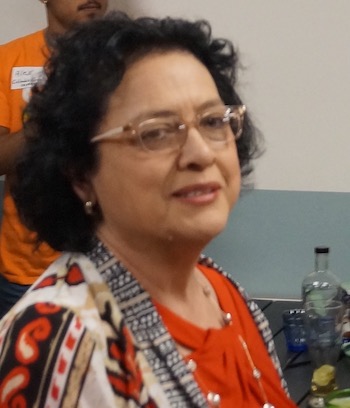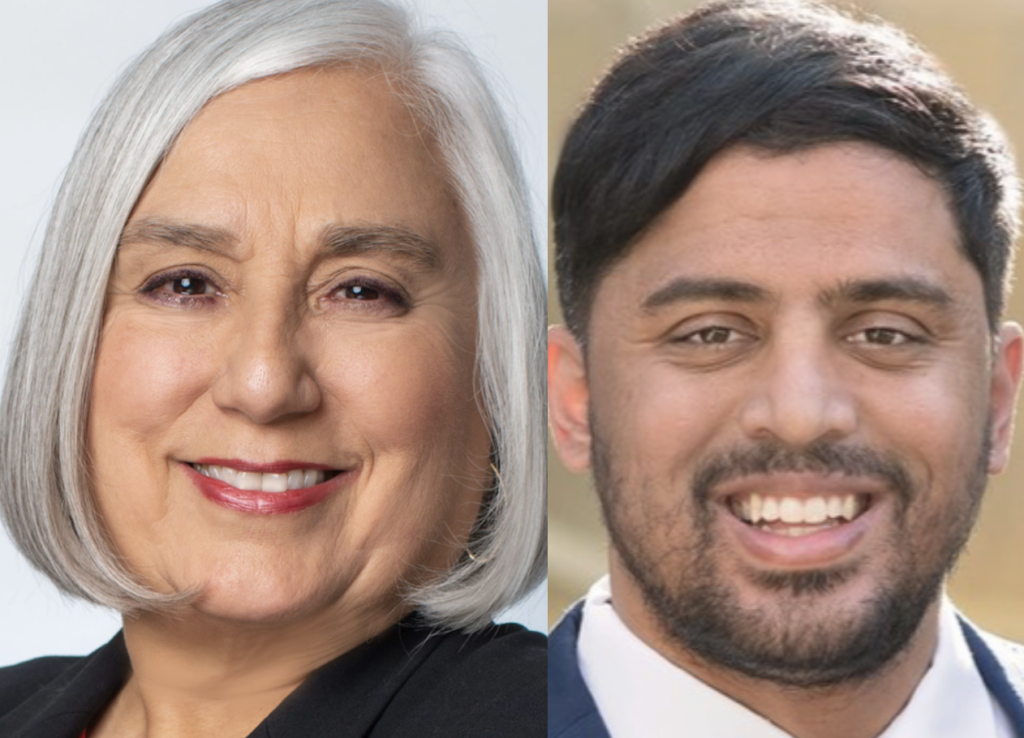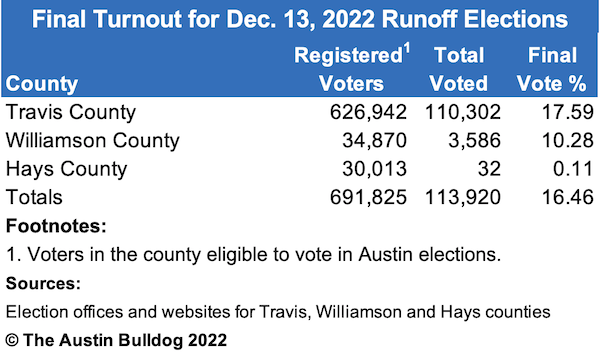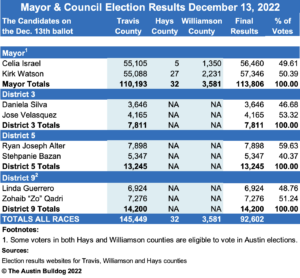Alter, Qadri and Velásquez win council seats
The margaritas were flowing in Celia Israel’s camp after the polls closed last night, the food was plentiful, and the crowd was lively. But the real party didn’t start until about 9:45pm at Kirk Watson’s camp, after the last results were reported from Williamson County.
Watson got 881 more votes in Williamson County, while Israel’s 17-vote lead in Travis County was wiped out by Watson’s 22-vote margin in Hays County. That handed Watson a final spread of 886 more votes, 50.39 percent to Israel’s 49.61 percent.
In a victory speech moments later, Watson declared, “tomorrow is a new day in Austin.”
“When we choose to work together, it will be the beginning of a new direction. When we choose to work together, we will heal old divides and solve old problems. When we choose to work together, Austin’s future will get brighter, and brighter, and brighter.”
Israel, for her part, conceded the race and said she would not seek a recount. It was a grim disappointment for her supporters just over a month after a jubilant Election Night in November when she pulled off a surprise first-place finish over Watson and four other opponents. In that election Israel got 15,356 more votes than did Watson.
Throughout the five-week runoff campaign, Watson and his allies launched attack after attack on Israel, boosted by a huge fundraising advantage, even as Israel sought to portray Watson as part of “the good ol’ boys club of the Austin establishment.”
Watson, 64, served previously as Austin mayor from 1997 to 2001. He resigned in his second term to run for attorney general of Texas, losing 41 percent to Greg Abbott’s 57 percent. He served in the state senate from 2007 to 2020, stepping down midway through his last term to become founding dean of the University of Houston’s Hobby School of Public Affairs.
Substantively, Watson and Israel differed on key issues, including the land development code, public safety, sanctioned campsites for the homeless (which Watson supports but Israel does not), and the widening of I-35 (which Watson supports but Israel does not).

In debates and campaign literature, Watson portrayed himself as a coalition-builder with a more accomplished record in the legislature than Israel. He attracted support from Democratic clubs, public sector unions, elected officials, the Real Estate Council of Austin, and, during the runoff after Republican Jennifer Virden had been eliminated, from local Republican leaders. Virden emailed a press release just before the polls closed on election day to say she would “be voting for Watson this time, hopefully to minimize the damage” but made it clear this was not an “endorsement.”
This will be the last time an Austin mayor is elected in a mid-term year between presidential elections. Following a charter amendment approved by voters last year, the next mayoral election will take place in 2024, with Watson serving a truncated two-year term until then.
Voter turnout was low in the November general election and even lower in the runoff at just 16.46 percent, according to data published by the election administrators of Travis, Hays, and Williamson counties. In all, 113,920 votes were cast out of 691,825 registered voters in the city. (See below chart, “Final Turnout for Dec. 13, 2022 Runoff Elections.)
Qadri wins in central Austin
The other major political development of the night was the win by Zohaib “Zo” Qadri over Linda Guerrero in central Austin’s District 9.

Qadri ran on an urbanist, pro-density platform against Guerrero, a former leader of the Hancock Neighborhood Association. He will replace Kathie Tovo, who was part of a bloc of four key council members who opposed CodeNext, a proposed overhaul of the land development code.
Tovo and District 5 Council Member Ann Kitchen, another member of that four-member coalition, both opted not to seek reelection, and both saw their hand-picked successor defeated. Tovo’s would-be successor Guerrero lost to Qadri by just 352 votes, and Kitchen’s longtime senior policy advisor Ken Craig did not advance to the runoff.
Those developments could mean a shift in the balance of power on the council on the land use issue, favoring the urbanist camp, despite Watson’s win over Israel.
Qadri, 32, focused his campaign resources toward university students and pulled off a big margin of victory in the precincts in and around the campus of the University of Texas at Austin.

He got a boost from many notable Austin progressives, including District Attorney José Garza, who emailed his own supporters on election day saying that Qadri “will take concrete actions to protect working families and address our affordability crisis. If we do those things, we can increase stability in our community and that will make us more safe.”
Other endorsers included Mayor Steve Adler, Congressman-elect Greg Casar, three of Qadri’s D9 rivals from the general election, and U.S. Senator Elizabeth Warren.
On the other hand, he faced criticism during the campaign from Guerrero, whose campaign portrayed him as an opportunist who had jumped from one political job to another for about a decade, including for Democratic, Republican, and Libertarian candidates.
In a statement after her loss, Guerrero thanked her supporters, saying, “We ran a respectable and thoughtful campaign based on the many concerns and issues brought forward from District 9 voters. I congratulate Zo and wish him all the best.”
Qadri, for his part, said that his campaign had been powered by “small-dollar contributions,” adding, “Ultimately we saw that young, diverse, and progressive voters won this election. Austin has now spoken and the call for action on our affordability crisis could not be more clear.”
José Velásquez beats Daniela Silva
In District 3, which includes the core of Hispanic East Austin, both candidates represented a younger alternative to the retiring Sabino “Pio” Renteria, who has served since geographic representation began in Austin in January 2015.
Voters opted for City Hall favorite José M.A. Velásquez, 42, over Daniela Silva, 30.
Velásquez, who had won endorsements from the Statesman and Chronicle, took 53.3 percent of the votes compared to 46.7 percent for Silva. Fewer than 8,000 votes were cast in the contest, compared to more than 13,000 in District 5 and 14,000 in District 9, the central Austin districts.

On council, Velásquez says he will advocate for better mental health services and a “holistic” approach to public safety. “I lost a brother to gun violence, so I know firsthand the impact untreated trauma can have on an individual,” he wrote in a candidate questionnaire.
By and large, however, Velásquez ran on a record of volunteerism and civic leadership rather than a more issues-focused campaign. That played to his advantage because he has deeper roots in the district than Silva, who grew up in Houston and is the daughter of a Columbian immigrant. Silva ran with a focus on the environment, housing, and healthcare infrastructure.
Both Velásquez and Silva are single, young professionals, and neither is a homeowner. As such, they represent the changing face of a district where dogs now outnumber children, according to a 2018 study on gentrification and displacement by University of Texas at Austin researchers.
The election of Velásquez and Qadri to the council means greater representation for renters, who comprise about half of the city’s population yet are underrepresented on the council. Of the sitting 11 council members, only Mackenzie Kelly and Paige Ellis are renters.
Ryan Alter wins big in District 5
By contrast, the runoff candidates in District 5 in south-central Austin are both married with children, and both are homeowners. In campaign literature, Stephanie Bazan, 42, and Ryan Alter, 33, both portrayed themselves in family settings, and both made housing affordability a centerpiece of their messaging.
During the campaign, Alter won praise from the Chronicle and other endorsers for having a solid grasp of land use policies and a detailed plan. He bested Bazan by a wide margin, 7,898 to 5,347, or 59.6 percent to 40.4 percent.

In an interview last night, Alter told the Bulldog he was feeling “excited, relieved, surprised—it’s all a jumble.” Asked why he thought he had won, he said, “We talked to a lot of people. I personally knocked on something like 12,000 people’s doors.”
“It was just really working the district, getting to know the people, and I felt like the more conversations we had with people the more they were wanting someone who was going to show up and really get things done for them. So I think our message really resonated with the voters and I’m really humbled they put their faith in me.”
When his term starts in January, Alter said that his priority would be “housing affordability first and foremost. We have got to make Austin a place where people can afford to live—we need to address our homelessness crisis, and we have just got to start being solutions-oriented. We have got to not take small nibble-at-the-edges approaches but actually meaningful action. That’s what people want. Every time I talked with people they were so tired of just what they felt was a council that was not responsive to the problems they were seeing.”
Alter is a former legislative aide to Kirk Watson and gave the interview at the Watson’s watch party at Santa Rita Cantina on West 38th Street.
Shift in council demographics
The runoff results mean four new faces on City Council, altering its demographic makeup.
Of the four women who were on the ballot last night, all lost, meaning there will now be six female members on the 11-member council, compared to eight currently.
Racially, the council will maintain three Hispanics representatives and one Black, while the number of Whites will drop from seven to six. Qadri, who is a son of Pakistani immigrants, will be the first Muslim member of the council.
In a statement, Qadri said, “It will be the honor of my life to serve and represent District 9 on the Austin City Council. I have never been more humbled, or excited for the future of Austin.”

Trust indicators: Bulldog reporter Daniel Van Oudenaren is a journalist with 13 years experience in local, state, and international reporting. He covers local elections and issues of government transparency and accountability at City Hall, Central Health, the Austin Transit Partnership, and other local governments.

Trust indicators: Bulldog editor Ken Martin has been doing investigative reporting in the three-county Austin metro area since 1981. His aggressive reporting twice garnered first-place national awards for investigative reporting. Both of those projects resulted in successful criminal prosecutions. His 2011 investigation of the Austin City Council’s open meetings violations triggered a 21-month investigation by the Travis County attorney that resulted in the mayor and council members signing deferred prosecution agreements to avoid being charged, tried, and if convicted serving one to six months in jail and forfeiting their elective offices. See more on Ken on the About page. Email [email protected].
Related Bulldog election coverage:
Watson moved to Austin to run for mayor, December 9, 2022
Men dominant in runoff election finances, December 6, 2022
The scoreboard for eight runoff candidates, December 5, 2022
Celia Israel in the hot seat in final stretch of mayoral campaign, December 5, 2022
Celia Israel blasted for defunding crime victims—but is it true? December 1, 2022
Mayor Watson’s scheme broke law, Senator Watson’s bill provided alternative, November 20, 2022
Mayoral race and three council contests will go to runoff, November 9, 2022
Watson grabbed 70 percent of mayoral donations, November 3, 2022
Watson circumvented law to fund new medical school, November 1, 2022
What kind of legislator was Celia Israel? October 28, 2022
What kind of major was Kirk Watson? October 24, 2022
Candidates offer competing visions on homelessness, October 18, 2022
The man who would be mayor…again, October 10, 2022
Want to get elected but not be accountable? September 28, 2022








